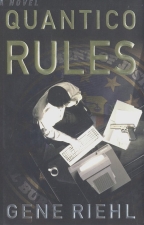Quantico Rules
Gene Riehl
St. Martins/Minotaur
US Hardcover First
ISBN: 0-312-31051-X
330 Pages: $24.95
Publication Date: August, 2003
Date Reviewed: August 25, 2003
Reviewed by: Terry D'Auray © 2003

REFERENCES
COLUMNS
|
|
|
Quantico RulesGene RiehlSt. Martins/MinotaurUS Hardcover FirstISBN: 0-312-31051-X330 Pages: $24.95Publication Date: August, 2003Date Reviewed: August 25, 2003Reviewed by: Terry D'Auray © 2003 |
|
|
REFERENCES |
COLUMNS |
Espionage novels started fading away with the end of the Cold War when spies, moles and their ilk lost a bit of their luster and a lot of their urgency. Gene Riehl resurrects the genre in contemporary times with up-to-the-minute themes in his novel, 'Quantico Rules', a first novel that's now appearing in the best first mystery picks of a number of mystery bookstores. Riehl is a former FBI agent specializing in foreign counterintelligence and espionage, now turned TV terrorism analyst, and it's his unique personal experience that sets this book apart from the norm.
Primary character Pullar Monk, FBI supervisor of a SPIN squad (Special Inquiries,) is conducting a background investigation for the White House of Judge Brenda Thompson, black nominee for Supreme Court justice. There's a thirty-year-old, three-week gap in the Justice's resume. Monk with his able (and of course sexy) assistant Agent Lisa Sands plunge into an investigation uncovering high-level corruption, blackmail and murder. It's all justified in the name of post-911 threats to domestic order.
Monk is long-time FBI agent, but also a compulsive gambler, a rebel who's happiest living life on danger's edge. He's also the angry, resentful son of Baptist Pastor Monk, his abusive, hell-and-brimstone-spouting father, now suffering from Alzheimer's. At the beginning of the book, Monk's life is a mess of unresolved parental angst, enormous indebtedness, a disintegrating romantic relationship, dead-end bureaucratic tedium, and a hateful boss. At the end of the book, Monk's life is pretty much the same, minus the hateful boss, plus a new, flammable romantic relationship. But in between, he manages to outwit, out-gun and out live a heinous super-killer and a powerful Hooveresque political manipulator.
Riehl's past FBI training provides insight into the Bureau's less-then-stellar Hoover-history and it's modern bureaucratic rituals. While Hoover may be long dead, says Riehl, the corrupt agenda he created still defines and controls the FBI. More enjoyably, though, Riehl also provides fine-tuned and interesting details into an agent's stock-in-trade activities like surveillance, tailing, eavesdropping, bugs and cameras. He nicely mixes high-tech gadgetry with old-fashioned spy stratagems, computer keystrokes with human chutzpah. There's a wealth of authentic and unusual detail here, used ably to nourish and distinguish what is basically an action-packed thriller.
As in many other espionage/thriller novels, the reader must endure some highly predictable exposition as alliances are made under pressure, as the details of "why you should trust us and not the other guys" are revealed. Riehl gets that stuff out of the way with dispatch, however, and doesn't let it bog down the pace or the action. And while some plot twists, on later reflection, are eye-rollers, they work perfectly well in context.
Riehl's writing is adept and intelligent, with touches of humor, but occasionally superficial. Secondary characters are thinly portrayed and more than a little stereotyped. The sexy, beautiful co-worker Agent Sands is headstrong and tough, but too easily bedded. The local Sheriff Brodsky, ex-LAPD, is too much the tenacious bulldog. But it doesn't really matter. This is a what-happens-next thriller, not a LeCarre character study. Riehl's plot and pacing are great. Characterization can develop as what is clearly intended to become a series continues.
'Quantico Rules' is an enjoyable read, and an intelligent page-turner that you won't be embarrassed to shelve in your library. 'Quantico Rules' sets-up a counter-terrorism theme for Monk's second outing, which given Riehl's background is likely to be even better than the first.